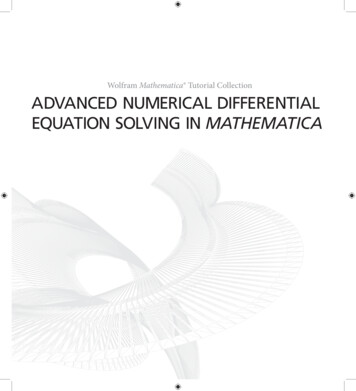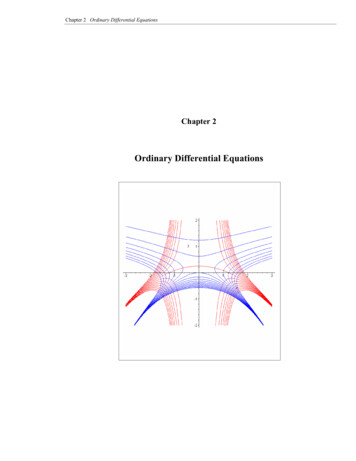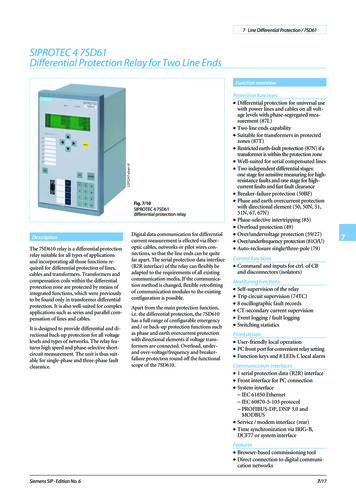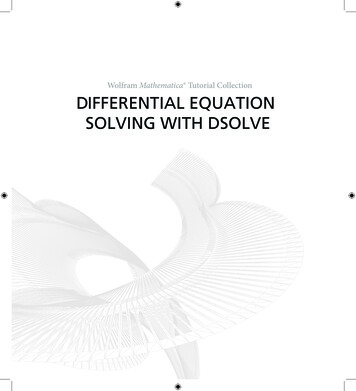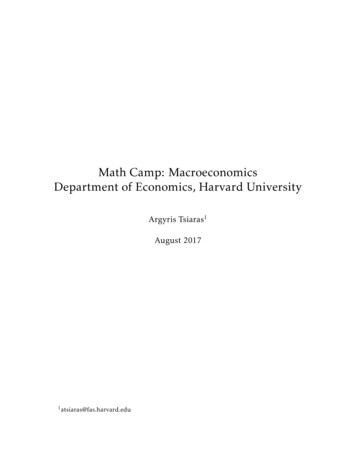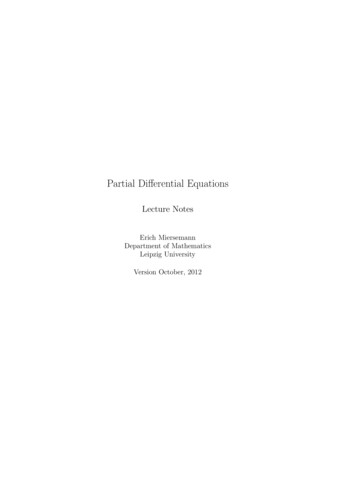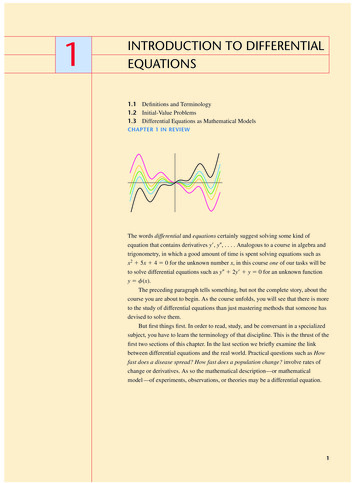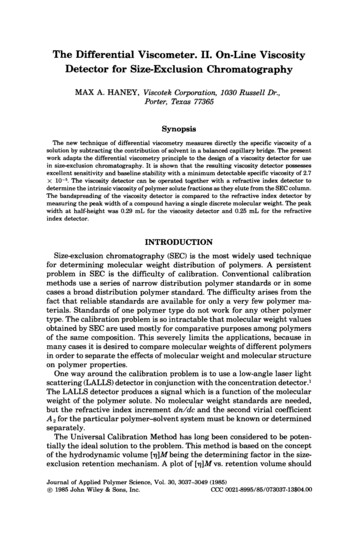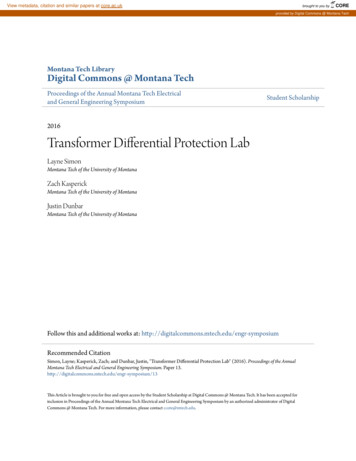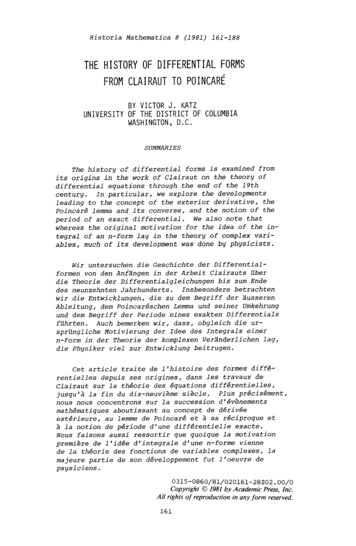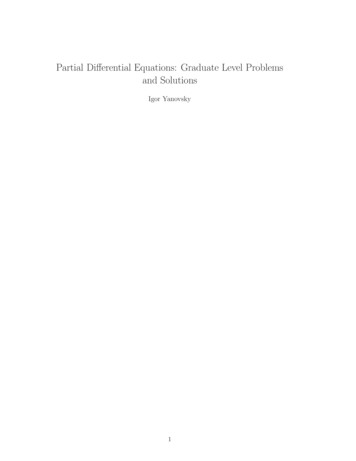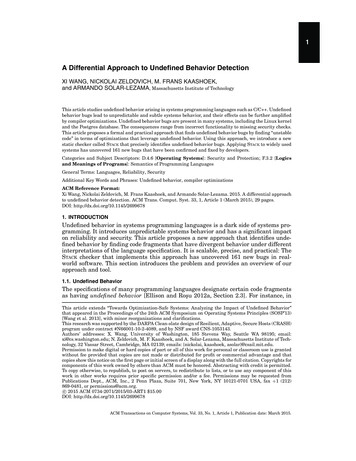
Transcription
1A Differential Approach to Undefined Behavior DetectionXI WANG, NICKOLAI ZELDOVICH, M. FRANS KAASHOEK,and ARMANDO SOLAR-LEZAMA, Massachusetts Institute of TechnologyThis article studies undefined behavior arising in systems programming languages such as C/C . Undefinedbehavior bugs lead to unpredictable and subtle systems behavior, and their effects can be further amplifiedby compiler optimizations. Undefined behavior bugs are present in many systems, including the Linux kerneland the Postgres database. The consequences range from incorrect functionality to missing security checks.This article proposes a formal and practical approach that finds undefined behavior bugs by finding “unstablecode” in terms of optimizations that leverage undefined behavior. Using this approach, we introduce a newstatic checker called STACK that precisely identifies undefined behavior bugs. Applying STACK to widely usedsystems has uncovered 161 new bugs that have been confirmed and fixed by developers.Categories and Subject Descriptors: D.4.6 [Operating Systems]: Security and Protection; F.3.2 [Logicsand Meanings of Programs]: Semantics of Programming LanguagesGeneral Terms: Languages, Reliability, SecurityAdditional Key Words and Phrases: Undefined behavior, compiler optimizationsACM Reference Format:Xi Wang, Nickolai Zeldovich, M. Frans Kaashoek, and Armando Solar-Lezama. 2015. A differential approachto undefined behavior detection. ACM Trans. Comput. Syst. 33, 1, Article 1 (March 2015), 29 pages.DOI: http://dx.doi.org/10.1145/26996781. INTRODUCTIONUndefined behavior in systems programming languages is a dark side of systems programming. It introduces unpredictable systems behavior and has a significant impacton reliability and security. This article proposes a new approach that identifies undefined behavior by finding code fragments that have divergent behavior under differentinterpretations of the language specification. It is scalable, precise, and practical: TheSTACK checker that implements this approach has uncovered 161 new bugs in realworld software. This section introduces the problem and provides an overview of ourapproach and tool.1.1. Undefined BehaviorThe specifications of many programming languages designate certain code fragmentsas having undefined behavior [Ellison and Roşu 2012a, Section 2.3]. For instance, inThis article extends “Towards Optimization-Safe Systems: Analyzing the Impact of Undefined Behavior”that appeared in the Proceedings of the 24th ACM Symposium on Operating Systems Principles (SOSP’13)[Wang et al. 2013], with minor reorganizations and clarifications.This research was supported by the DARPA Clean-slate design of Resilient, Adaptive, Secure Hosts (CRASH)program under contract #N66001-10-2-4089, and by NSF award CNS-1053143.Authors’ addresses: X. Wang, University of Washington, 185 Stevens Way, Seattle WA 98195; email:xi@cs.washington.edu; N. Zeldovich, M. F. Kaashoek, and A. Solar-Lezama, Massachusetts Institute of Technology, 32 Vassar Street, Cambridge, MA 02139; emails: {nickolai, kaashoek, asolar}@csail.mit.edu.Permission to make digital or hard copies of part or all of this work for personal or classroom use is grantedwithout fee provided that copies are not made or distributed for profit or commercial advantage and thatcopies show this notice on the first page or initial screen of a display along with the full citation. Copyrights forcomponents of this work owned by others than ACM must be honored. Abstracting with credit is permitted.To copy otherwise, to republish, to post on servers, to redistribute to lists, or to use any component of thiswork in other works requires prior specific permission and/or a fee. Permissions may be requested fromPublications Dept., ACM, Inc., 2 Penn Plaza, Suite 701, New York, NY 10121-0701 USA, fax 1 (212)869-0481, or permissions@acm.org.c 2015 ACM 0734-2071/2015/03-ART1 15.00 DOI: http://dx.doi.org/10.1145/2699678ACM Transactions on Computer Systems, Vol. 33, No. 1, Article 1, Publication date: March 2015.
1:2X. Wang et al.Fig. 1. A pointer overflow check found in several code bases. The code becomes vulnerable as gcc optimizesaway the second if statement [Dougherty and Seacord 2008].C “use of a nonportable or erroneous program construct or of erroneous data” leads toundefined behavior [ISO/IEC 2011, Section 3.4.3]. A comprehensive list of undefinedbehavior in C is available in the language specification [ISO/IEC 2011, Section J.2].One category of undefined behavior is simply programming mistakes, such as bufferoverflow, and null pointer dereference.The other category is nonportable operations, the hardware implementations ofwhich often have subtle differences. For example, when signed integer overflow ordivision by zero occurs, a division instruction traps on x86 [Intel 2013, Section 3.2],while it silently produces an undefined result on PowerPC [IBM 2010, Section 3.3.8].Another example is shift instructions: Left-shifting a 32-bit one by 32 bits produceszero on ARM and PowerPC, but one on x86; however, left-shifting a 32-bit one by 64bits produces zero on ARM, but one on x86 and PowerPC.By designating certain programming mistakes and nonportable operations as havingundefined behavior, the specifications give compilers the freedom to generate instructions that behave in arbitrary ways in those cases, thus allowing compilers to generateefficient and portable code without extra checks. For example, many higher level programming languages (e.g., Java) have well-defined handling (e.g., runtime exceptions)on buffer overflow, and the compiler would need to insert extra bounds checks for memory access operations. However, the C/C compiler does not to need to insert boundschecks because out-of-bounds cases are undefined. It is the programmer’s responsibilityto avoid undefined behavior.1.2. Risks of Undefined BehaviorAccording to the C/C specifications, programs that invoke undefined behavior canhave arbitrary problems. As one summarized, “permissible undefined behavior rangesfrom ignoring the situation completely with unpredictable results, to having demonsfly out of your nose” [Woods 1992]. But what happens in practice?One risk of undefined behavior is that a program will display different behavioron different hardware architectures, operating systems, or compilers. For example, aprogram that performs an oversized left-shift will display different results on ARMand x86 processors. As another example, a simple SQL query caused signed integeroverflow in the Postgres database server; on a 32-bit Windows system, this did notcause any problems, but on a 64-bit Windows system, it caused the server to crash dueto the different behavior of division instructions on the two systems (see Section 6.2.1for details).In addition, compiler optimizations can amplify the effects of undefined behavior.For example, consider the pointer overflow check buf len buf shown in Figure 1,where buf is a pointer and len is a positive integer. The programmer’s intention is tocatch the case when len is so large that buf len wraps around and bypasses the firstcheck in Figure 1. We have found similar checks in a number of systems, including theACM Transactions on Computer Systems, Vol. 33, No. 1, Article 1, Publication date: March 2015.
A Differential Approach to Undefined Behavior Detection1:3Chromium browser [Chromium 2013], the Linux kernel [Wang et al. 2012a], and thePython interpreter [Python 2013].Although this check appears to work with a flat address space, it fails on a segmentedarchitecture [ISO/IEC 2003, Section 6.3.2.3]. Therefore, the C standard states that anoverflowed pointer is undefined [ISO/IEC 2011, Section 6.5.6/p8], which allows gcc tosimply assume that no pointer overflow ever occurs on any architecture. Under thisassumption, buf len must be larger than buf, and thus the “overflow” check alwaysevaluates to false. Consequently, gcc removes the check, paving the way for an attackto the system [Dougherty and Seacord 2008].As we demonstrate in Section 2, many optimizing compilers make similar assumptions that programmers never invoke undefined behavior. Consequently, these compilers turn each operation into an assumption about the arguments to that operation. Thecompilers then proceed to optimize the rest of the program under these assumptions.These optimizations can lead to baffling results even for veteran C programmersbecause code unrelated to the undefined behavior gets optimized away or transformedin unexpected ways. Such bugs lead to spirited debates between compiler developersand practitioners who use the C language but do not adhere to the letter of the official C specification. Practitioners describe these optimizations as ones that “make nosense” [Torvalds 2007] and as being merely the compiler’s “creative reinterpretation ofbasic C semantics” [Lane 2005]. On the other hand, compiler writers argue that theoptimizations are legal under the specification; it is the “broken code” [GCC 2007] thatprogrammers should fix. Worse yet, as compilers evolve, new optimizations are introduced that may break code that used to work before; as we show in Section 2.2, manycompilers have become more aggressive over the past 20 years with such optimizations.1.3. Status and Challenges of Undefined Behavior DetectionGiven the wide range of problems that undefined behavior can cause, what shouldprogrammers do about it? The naı̈ve approach is to require programmers to carefully read and understand the C language specification so that they can write carefulcode that avoids invoking undefined behavior. Unfortunately, as we demonstrate inSection 2.1, even experienced C programmers do not fully understand the intricaciesof the C language, and it is exceedingly difficult to avoid invoking undefined behaviorin practice.Since optimizations often amplify the problems due to undefined behavior, someprogrammers (such as the Postgres developers [Lane 2009]) have tried reducing thecompiler’s optimization level so that aggressive optimizations do not take advantage ofundefined behavior bugs in their code. As we see in Section 2.2, compilers are inconsistent about the optimization levels at which they take advantage of undefined behavior,and several compilers make undefined behavior optimizations even at optimizationlevel zero (which should, in principle, disable all optimizations).Runtime checks can be used to detect certain undefined behaviors at runtime; forexample, gcc provides an -ftrapv option to trap on signed integer overflow, and clangprovides an -fsanitize undefined option to trap several more undefined behaviors.There have also been attempts at providing a more “programmer-friendly” refinementof C [Cuoq et al. 2014; Miller 2012], which has less undefined behavior, although ingeneral it remains unclear how to outlaw undefined behavior from the specificationwithout incurring significant performance overhead [Wang et al. 2012a; Cuoq et al.2014].Certain static-analysis and model checkers identify classes of bugs due to undefinedbehavior. For example, compilers can catch some obvious cases (e.g., using gcc’s -Wall),but in general it is challenging [Lattner 2011, part 3]; tools that find buffer overflowbugs [Chen et al. 2011] can be viewed as finding undefined behavior bugs becauseACM Transactions on Computer Systems, Vol. 33, No. 1, Article 1, Publication date: March 2015.
1:4X. Wang et al.referencing a location outside of a buffer’s range is undefined behavior. See Section 7for a more detailed discussion of related work.1.4. Approach: Finding Divergent BehaviorIdeally, compilers would generate warnings for developers when an application invokesundefined behavior, and this article takes a static analysis approach to finding undefined behavior bugs. This boils down to deciding, for each operation in the program,whether it can be invoked with arguments that lead to undefined behavior. Since manyoperations in C can invoke undefined behavior (e.g., signed integer operations, pointerarithmetic), producing a warning for every operation would overwhelm the developer,so it is important for the analysis to be precise. Global reasoning can precisely determine what values an argument to each operation can take, but it does not scale to largeprograms.Instead of performing global reasoning, our goal is to find local invariants (or likelyinvariants) on arguments to a given operation. We are willing to be incomplete: If thereare not enough local invariants, we are willing to not report potential problems. Onthe other hand, we would like to ensure that every report is likely to be a real problem[Bessey et al. 2010].The local likely invariant that we exploit in this article has to do with unnecessarysource code written by programmers. By “unnecessary source code” we mean dead code,unnecessarily complex expressions that can be transformed into a simpler form, andthe like. We expect that all of the source code that programmers write should eitherbe necessary code, or it should be clearly unnecessary; that is, it should be clear fromlocal context that the code is unnecessary, without relying on subtle semantics of theC language. For example, programmers might write if (0) { . }, which is clearlyunnecessary code. However, our likely invariant tells us that programmers would neverwrite a b c; if (c 32) {.}, where b is a 32-bit integer. The if statementin this code snippet is unnecessary code because the value of c could never be 32 orgreater due to undefined behavior in the preceding left-shift. The core of our invariantis that programmers are unlikely to write such subtly unnecessary code.To formalize this invariant, we need to distinguish “live code” (code that is alwaysnecessary), “dead code” (code that is always unnecessary), and “unstable code” (codethat is subtly unnecessary). We do this by considering the different possible interpretations that the programmer might have for the C language specification. In particular,we consider C to be the language’s official specification and C to be a specification thatthe programmer believes C has. For the purposes of this article, C differs from C inwhich operations lead to undefined behavior. For example, a programmer might expectshifts to be well-defined for all possible arguments; this is one such possible C . In otherwords, C is a relaxed version of the official C in that it assigns certain interpretationsto operations that are undefined in C.Using the notion of different language specifications, we say that a piece of code islive if, for every possible C , the code is necessary. Conversely, a piece of code is dead if,for every possible C , the code is unnecessary; this captures code like if (0) { . }.Finally, a piece of code is unstable if, for some C variants, it is unnecessary, but in otherC variants, it is necessary. This means that two programmers who do not preciselyunderstand the details of the C specification might disagree about what the code isdoing. As we demonstrate in the rest of this article, this heuristic often indicates thepresence of a bug.Building on this invariant, we can now detect when a program is likely invokingundefined behavior. In particular, given an operation o in a function f , we compute theset of unnecessary code in f under different interpretations of undefined behavior at o.If the set of unnecessary code is the same for all possible interpretations, we cannot sayACM Transactions on Computer Systems, Vol. 33, No. 1, Article 1, Publication date: March 2015.
A Differential Approach to Undefined Behavior Detection1:5anything about whether o is likely to invoke undefined behavior. However, if the set ofunnecessary code varies depending on what undefined behavior o triggers, this meansthat the programmer wrote unstable code. However, by our assumption, this shouldnever happen, and we conclude that the programmer was likely thinking that he waswriting live code and simply did not realize that o would trigger undefined behavior forthe same set of inputs that are required for the code to be live.1.5. The Stack ToolTo find undefined behavior bugs using this approach, we built a static analysis toolcalled STACK. In practice, it is difficult to enumerate and consider all possible C variants. Thus, to build a practical tool, we pick a single variant, called C . C definesa null pointer that maps to address zero and wrap-around semantics for pointer andinteger arithmetic [Ranise et al. 2013]. We believe this captures the common semanticsthat programmers (mistakenly) believe C provides. Although our C deals with only asubset of undefined behaviors in the C specification, a different C could capture othersemantics that programmers might implicitly assume or handle undefined behaviorfor other operations that our C does not address.STACK relies on an optimizer O to implicitly flag unnecessary code. STACK’s O eliminates dead code and performs expression simplifications under the semantics of C andC , respectively. For code fragment e, if O is not able to rewrite e under either semantics, STACK considers e as “live code”; if O is able to rewrite e under both semantics, e is“dead code”; if O is able to rewrite e under C but not C , STACK reports it as “unstablecode.” We describe this approach more precisely in Section 3.Since STACK uses just two interpretations of the language specification (namely, C andC ), it might miss bugs that could arise under different interpretations. For instance,any code eliminated by O under C would never trigger a warning from STACK even ifthere might exist another C that would not allow eliminating that code. STACK’s approach could be extended to support multiple interpretations to address this potentialshortcoming.1.6. ContributionsThis article makes several contributions, as follows:(1) The first detailed study of the impact and prevalence of undefined behavior bugsin real-world software and of how compilers amplify the problems. This study findsthat undefined behavior is prevalent, has many risks, and is increasingly exploitedby compiler optimizations.(2) A scalable approach to detecting undefined behavior in large programs throughdifferential interpretation.(3) A formalization of this approach that can be applied in practice.(4) A practical static analysis tool, called STACK, based on this formalization.(5) A large-scale evaluation of STACK, which demonstrates that STACK can find 161 realbugs in a wide range of widely used software. We reported these bugs to developers,and almost all of them were fixed, suggesting that STACK’s reports are precise.Overall, this article demonstrates that undefined behavior bugs are much moreprevalent than was previously believed and that they lead to a wide range of significantproblems.1.7. RoadmapThe rest of the article is organized as follows. Section 2 provides a detailed case studyof unstable code in real systems and compilers. Section 3 presents a formalization ofunstable code. Section 4 describes the design and implementation of the STACK checkerACM Transactions on Computer Systems, Vol. 33, No. 1, Article 1, Publication date: March 2015.
1:6X. Wang et al.Fig. 2. A null pointer dereference vulnerability (CVE-2009-1897). The dereference of pointer tun comesbefore the null pointer check. The code becomes exploitable as gcc optimizes away the null pointer check[Corbet 2009].for identifying unstable code. Section 6 reports our experience of applying STACK toidentify unstable code and evaluates STACK’s techniques. Section 7 covers related work.Section 8 concludes the article.2. CASE STUDIESThis section provides case studies of undefined behavior and how it can lead to unstablecode. It builds on earlier surveys [Wang et al. 2012a; Krebbers and Wiedijk 2012;Seacord 2010] and blog posts [Lattner 2011; Regehr 2010, 2012] that describe unstablecode examples and extends them by investigating the evolution of optimizations incompilers. From the evolution, we conclude that unstable code will grow as futurecompilers implement more aggressive optimization algorithms.2.1. Examples of Unstable CodeIt is well known that compiler optimizations may produce undesirable behavior for imperfect code [IBM 2009]. Recent advances in optimization techniques further increasethe likelihood of such undesired consequences because they exploit undefined behavioraggressively, exposing unstable code as a side effect. This section reviews representative cases that have sparked interest among programmers and compiler writers.2.1.1. Pointer Overflow and a Disputed Vulnerability Note. As described in Section 1.2,the C language standard states that an overflowed pointer is undefined [ISO/IEC2011, Section 6.5.6/p. 8], which voids any pointer “overflow” check, such as the checkbuf len buf shown in Figure 1. This allows the compiler to perform aggressiveoptimizations, including removing the check.The earliest report of such an optimization that we are aware of is a gcc bug filedin 2006, in which a programmer reported that gcc removed a pointer overflow checkintended for validating network packets, even “without optimizer” (i.e., using -O0) [GCC2006]. This bug was marked as a “duplicate” with no further action.The issue received much attention in 2008 when the US-CERT published a vulnerability note regarding a crash bug in plan9port (Plan 9 from User Space), suggesting thatprogrammers “avoid newer versions of gcc” in the original security alert [Doughertyand Seacord 2008]. The crash was caused by gcc removing a pointer overflow check ina string formatting function [Cox 2008]. The gcc developers disputed the vulnerabilitynote and argued that this optimization is allowed by the specification and performedby many other compilers as well. The vulnerability note was revised later, with “gcc”changed to “some C compilers” [Dougherty and Seacord 2008].2.1.2. Null Pointer Dereference and a Kernel Exploit. In addition to introducing new vulnerabilities, optimizations that remove unstable code can amplify existing weaknesses inthe system. Figure 2 shows a mild defect in the Linux kernel, where the programmerACM Transactions on Computer Systems, Vol. 33, No. 1, Article 1, Publication date: March 2015.
A Differential Approach to Undefined Behavior Detection1:7Fig. 3. A signed integer overflow check offset len 0. The intention was to prevent the case whenoffset len overflows and becomes negative.incorrectly placed the dereference tun- sk before the null pointer check !tun. Normally,the kernel forbids access to page zero; a null tun pointing to page zero causes a kerneloops at tun- sk and terminates the current process. Even if page zero is made accessible (e.g., via mmap or some other exploits [Jack 2007; Tinnes 2009]), the check !tunwould catch a null tun and prevent any further exploits. In either case, an adversaryshould not be able to go beyond the null pointer check.Unfortunately, this simple bug becomes an exploitable vulnerability. When gcc firstsees the dereference tun- sk, it concludes that the pointer tun must be non-null becausethe C standard states that dereferencing a null pointer is undefined [ISO/IEC 2011,Section 6.5.3]. Since tun is non-null, gcc further determines that the null pointer checkis unnecessary and eliminates the check, thus making a privilege escalation exploitpossible that otherwise would not be [Corbet 2009].2.1.3. Signed Integer Overflow from Day One. Signed integer overflow has been presentin C even before there was a standard for the language—the Version 6 Unix used thecheck mpid 1 0 to detect whether it runs out of process identifiers, where mpid isa non-negative counter [Lions 1977, Section 7.13]. Such overflow checks are unstablecode and unlikely to survive with today’s optimizing compilers. For example, both gccand clang conclude that the “overflow check” x 100 x with a signed integer x isalways false. Some programmers were shocked that gcc turned the check into a no-op,leading to a harsh debate between the C programmers and the gcc developers [GCC2007].A common misbelief is that signed integer operations always silently wrap aroundon overflow using two’s complement, just like unsigned operations. This is false at theinstruction set level, including older mainframes that use one’s complement, embedded processors that use saturation arithmetic, and even architectures that use two’scomplement. For example, although most x86 signed integer instructions do silentlywrap around, there are exceptions, such as signed division that traps for INT MIN/ 1[Intel 2014, Section 3.2]. In C, signed integer overflow is undefined behavior [ISO/IEC2011, Section 6.5].Figure 3 shows another example from the fallocate system call implementation inthe Linux kernel. Both offset and len are provided by a user-space application; theycannot be trusted and must be validated by the kernel. Note that they are of the signedinteger type loff t.The code first rejects negative values of offset and len and checks whetheroffset len exceeds some limit. The comment says “[c]heck for wrap through zerotoo,” indicating that the programmer realized that the addition may overflow andACM Transactions on Computer Systems, Vol. 33, No. 1, Article 1, Publication date: March 2015.
1:8X. Wang et al.Fig. 4. An uninitialized variable misuse for pseudorandom number generation. It was in the libc of FreeBSDand OS X; clang optimizes away the entire seed computation (CVE-2013-5180).bypass the limit check. The programmer then added the overflow check offset len 0 to prevent the bypass.However, gcc is able to infer that both offset and len are non-negative at thepoint of the overflow check. Along with the knowledge that signed addition overflowis undefined, gcc concludes that the sum of two non-negative integers must be nonnegative. This means that the check offset len 0 is always false and gcc removesit. Consequently, the generated code is vulnerable: An adversary can pass in two largepositive integers from user space, the sum of which overflows, and bypass all the sanitychecks.2.1.4. Uninitialized Read and Less Randomness. A local variable in C is not initializedto zero by default. A misconception is that such an uninitialized variable lives on thestack, holding a “random” value. This is not true. A compiler may assign the variable toa register (e.g., if its address is never taken), where its value is from the last instructionthat modified the register rather than from a stack location. Moreover, on Itanium ifthe register happens to hold a special not-a-thing value, reading the register trapsexcept for a few instructions [Intel 2010, Section 3.4.3].Reading an uninitialized variable is undefined behavior in C [ISO/IEC 2011, Section 6.3.2.1]. A compiler can assign any value to the variable and also to expressionsderived from the variable.Figure 4 shows such a problem in the srandomdev function of FreeBSD’s libc, whichalso appears in DragonFly BSD and Mac OS X. The corresponding commit messagesays that the programmer’s intention of introducing junk was to “use stack junk value,”which is left uninitialized intentionally as a source of entropy for pseudorandom number generation. Along with current time from gettimeofday and the process identification from getpid, the code computes a seed value for srandom.Unfortunately, the use of junk does not introduce more randomness from the stack:Both gcc and clang assign junk to a register; clang further eliminates computationderived from junk completely and generates code that does not use either gettimeofdayor getpid.2.2. An Evolution of OptimizationsTo understand the evolution of compilers with respect to optimizing unstable code, weconduct a study using six representative examples in the form of sanity checks, asshown in the top row of Figure 5. All of these checks may evaluate to false and becomedead code under optimizations because they invoke undefined behavior. We use themto test existing compilers next.—The check p 100 p resembles Figure 1 in Section 2.1.1.—The null pointer check ! p with an earlier dereference is from Figure 2 inSection 2.1.2.—The check x 100 x with a signed integer x is from Section 2.1.3.—Another check x 100 0 tests whether optimizations perform more elaboratereasoning; x is known to be positive.ACM Transactions on Computer Systems, Vol. 33, No. 1, Article 1, Publication date: March 2015.
A Differential Approach to Undefined Behavior Detection1:9Fig. 5. Optimizations of unstable code in popular compilers. This includes gcc, clang, aCC, armcc, icc, msvc,open64, pathcc, suncc, TI’s TMS320C6000, Wind River’s Diab compiler, and IBM’s XL C compiler. In theexamples, p is a pointer, x is a signed integer, and x is a positive signed integer. In each cell, “On” meansthat the specific version of the compiler optimizes the check into false and discards it at optimization level nwhereas “–” means that the compiler does not discard the check at any level.—The shift check !(1 x) was intended to catch a large shifting amount x, from apatch to the ext4 file system [Linux kernel 2009].—The check abs(x) 0, intended to catch the most negative value (i.e., 2n 1 ), testswhether optimizations understand library functions [GCC 2011].We chose 12 well-known C/C compilers to see what they do with the unstable codeexamples: two open-source compilers (gcc and clang) and 10 recent commercial compilers (HP’s aCC, ARM’s armcc, Intel’s icc, Microsoft’s msvc, AMD’s open64, PathScale’spathcc, Oracle’s suncc, TI’s TMS320C6000, Wind River’s Diab compiler, and IBM’s XLC compiler). For every unstable code example, we test whether a compiler optimizesthe check into false, and, if so, we find the lowest optimization level -On at which ithappens. The result is shown in Figure 5.We further use gcc and clang to study the evolution of optimizations because thehistory is easily accessible. For gcc, we chose the f
and the Postgres database. The consequences range from incorrect functionality to missing security checks. . Using this approach, we introduce a new static checker called STACK that precisely identifies undefined behavior bugs. Applying STACK to widely used systems has uncovered 161 new bugs that have been confirmed and fixed by .
